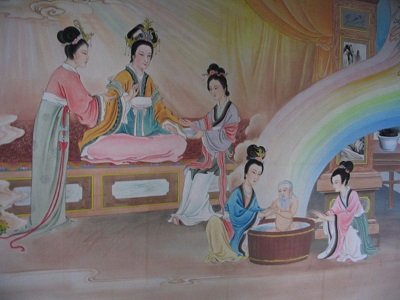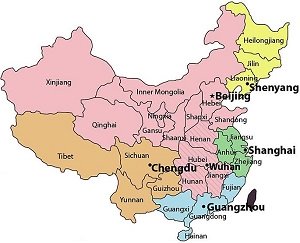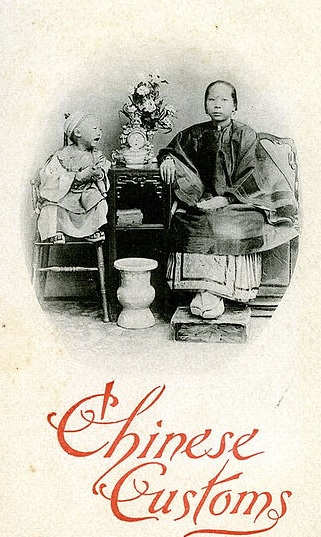Chinese Baby Customs
A ray of hope flickers in the sky,
A tiny star lights up way up high,
All across the land
Dawns a brand-new morn,
This comes to pass
When a child is born.
--- Theme song of Wolf

Chinese baby customs are rich in history, meaning and tradition.
The birth of a new baby is always an important and happy event in many cultures. Chinese culture is no exception and rich in various rituals and beliefs of this significant moment. Usually, celebrations are held when the baby is born, three days old, one month old, a hundred days old and at his/her one year birthday. To celebrate or discuss the child prior to birth is considered very bad luck.
According to The Book of Songs, when a boy is born, he will sleep on the bed, wear pageantry clothes, and play jewelry. But when a girl is born, she will sleep on the floor, be wrapped in swaddling clothes, play earthen spindle. Obviously, people have valued boys more than girls in the old times.
On the third day after the childbirth, parents have to hold the baby out (if it is a boy), to shoot arrows to all sides, which means that this boy will be with strong ambition when he grows up. If it is a girl, it is not necessary to follow this. There is also a ceremony of bath. At this time, relatives and friends will come to graduate and bring some rice, chicken or cloth, hoping the baby will have enough to eat and wear, while parents invite them to eat pastry. In old days, mother begins to nurse the newborn baby from this day on. At first, she will smear some coptis (bitter) water on the nipple, and then some sweet water, which indicates no sweet without sweat.
When the baby is a full month old, the family holds a big party for the newborn: this often means a big dinner banquet. Red overall plays a big part in the celebration as a sign of luck and prosperity. At the beginning of the dinner party, baby’s father and guest representative will give a little speech, expressing their wishes for this baby. Guests come with different kinds of gifts, baby clothes or baby toys for example. Parents will give them some red eggs to show their acknowledgements. Also on this day, parents have to bring the baby out, to invite relatives.
The one-hundred-day of the baby is also called one-hundred-year-day, indicating that the baby will be healthy and live a long time. The folk-custom is: parents ask a barber to shave the baby’s hair and keep down one fistful at the back side of head. This fistful of hair is called hundred-year-hair, hoping that this baby can live 100 years’ old.
The most common custom when the baby is one year old is draw lots. On that day, parents will lay some symbolic things before him/her to choose so as to detect his/her future ambitions. For example: if the baby grasps a book, it indicates that this baby will be good at studying and become a scholar in the future; if it grasps a pen, it indicates he/she will become a writer or artist; if it grasps an abacus, it indicates that he/she will become a businessman or accountant; if it grasps money, he/she will be very rich in the future, etc. Qian Zhongshu, a famous litterateur in modern China, whose name was rooted in this custom: when he was one year old, he grasped a book, so he was named Zhongshu, which means “love books”.
Major traditional
cultures

China has a vast territory, abundant resources, a long history and a large population. People in different regions and religions have different customs. But there is still something in common. Some examples are as follows.
Red egg:
In many regions, parents will send some red eggs - red dyed boiled eggs - to neighbors and friends. Red is a lucky and happy color in China. It can ward off disasters and bless the baby’s safety, good health and longevity. Nowadays, people are hardly willing to waste time doing red eggs by themselves. Instead, they usually buy some ready-made red eggs, or use delicate candies or cakes to replace with.
A hundred families’ clothes:
New born babies are also supposed to wear a so-called “a hundred families’ clothes” which is made of colorful cloth strips to avoid bad fortune. Parents today are also willing to use second-hand clothes. The reasons are: these clothes have been washed for several times and wiped off chemicals; they are much more comfortable than new clothes.
Longeval lock:
The longeval lock can be traced back to Ming and Qing Dynasty, when parents hang a ring with lock shape on the baby’s neck, to “lock” their life. Longeval lock is always made of silver, sometimes gold and jade, with well-wishing characters and lucky pictures on both sides. Lock and bracelets are all best gifts for a new born baby.
Shaving foetal hair:
In Chinese culture, babies will be shaved foetal hair when they are one-month old or a hundred days old. For doing so, parents hope to reject bad things and make babies’ hair become blacker and thicker. Many parents will keep the foetal hair as a souvenir. Some even make brush pen or stamp with the hair.
Names of the baby:
Many people reckon that name can influence one’s life. A baby usually has three names: one is the scientific name – the name used on the identity card, the formal name used when he/she goes to school. The second is nomen – from which one can obviously see which rank you are in the whole family. These two names are usually picked by the sainted eldership. The third one is a pet name. In the countryside, parents will also give the baby a humble name, such as Gousheng (a dog), Shitou (stone), Shadan (stupid child). They think the humbler the name is, the easier the baby will survive.
Customs for the Mother After Birth

Once the mother has given birth, the health of the child and mother are at the most delicate state of their lives. Many women in olden days would lose their lives to childbirth. Thus for the Chinese, this became a period of careful monitoring and care. During the month after the child is born, the mother would remain in bed or at least confined to the house. She would be given many rich foods, like pork and eggs. These high iron and protein foods would help her replenish the blood she had lost. Crucian, pettitoes, soybean, peanut, loach, and hen are considered the best food for mother to excrete more breast milk. The mother should better not bath and touch tap water and cold water during this month. She can use ginger water to wash hair; use argy wormwood leaf and some other herbs to boil water for a bath.
Ms Zou, a young mother who has just born her lovely daughter several months ago. Her family held a big dinner party on the one hundred day. “Waa.. it is really amazing!” she says, “My baby is like a super star – dressing whole red, wearing silver lock and bracelets. Every person comes to her and praise: how lovely, how beautiful, how smart… haha… It seems that she is a princess. The suffering at giving birth is not worth mentioning at that moment. I almost forget myself in the happiness.”
“This is my first experience in the operating room. My baby was born in the dawn, and I have almost exhausted in that night. On the second day, I have to nurse my baby and do some healing treatment. You can image how tired I am! When I’m back at home, my mother does not allow me to wash hair and bath. Oh, no, it’s midsummer! The baby is so small and soft, when he is in my arms, I can hardly move! Lucky, we hired a puerpera-sitter to take after my baby and me, so that we can have an easier maternity month.”
Different cultures
Different areas and nations have their unique ways of celebrating.
In Hunan Province, people use boiled eggs with tea and some other medicinal materials to roll through the new baby, indicating that the baby will be health and not attacked by virus. And the baby will be friendly and folksy as well.
In Guangdong province, people will celebrate on the 12th day after childbirth. This is called “Dachao”. On that day, the family will invite guests with yellow wine chicken. And add black soybeans for a boy.
In Shanghai, the baby’s uncle - brother of baby’s mother – hold the baby to cross bridges with water under it. The more bridges the better.
In the Yellow River Basin, grandparents will make some tiger-head shoes/hat/pillow for the baby, hoping that the newborns become as dynamic as tiger.
In Hui nationality, when a baby is born, no one other than the finger smith is allowed to enter the delivery room, not even the husband. If a boy is born, they will let a smart, brave, honest man in the family to first enter the delivery room; if a girl is born, a soft, kind and industrious woman will enter first. Because people in Hui nationality consider that, the new baby will be like the first one who enters the room in proclivity and temperament.
In Uygur nationality, people will put a brazier in the doorway to avoid disaster and praise for good luck.
In Hani nationality, the new baby must be named within 11 days after he/she was born. On that day, the baby is carried out for the first time. People kill chicken and cook sticky rice before that. Besides, one 8 or 9 years’ old child stand in the middle of the courtyard, simulate working. They announce the naissance of the baby by this ceremony.
Celebrating in modern China
In modern China, things are much easier.
Some traditional cultures are considered feudalism and superstition. New parents, especially those who do not live together with their relatives, are just usually holding a dinner party instead. Guests will also bring some gifts. Some will give cash in red papers as a token for good luck.
Along with the development of an era, some new celebrating ways emerged, such as stamping baby’s handprint and footprint, taking beautiful photos.
Taboo
Pregnant women have some taboos to avoid as well.
They can not attend wedding ceremonies and funerals, which are considered unlucky; they can not eat rabbit, which will make the baby’s mouth same as that of the rabbit (cleft lip); they can not laugh at others’ baby, especially those with physiological deficiency, doing so can result in deficiency of their own baby; etc. Yet, these taboos are superstitious, with no scientific basis.
Also in some places of Guangdong province, when a woman is with a baby, her family cannot move furniture, or put nails into the wall, which can lead to abortion. And pregnant women can not visit a new baby’s home or, can not hold the newborn baby, which can make the baby cry for a long time.
Conclusion
In all Chinese regions and cultures, giving birth to a baby is a beautiful and special occasion. In both old and modern times, there are wonderful celebrations and customs that are followed to welcome a baby into the world. Each unique custom comes from China's diverse and fascinating history, and every custom strives to give each baby a healthy and prosperous future. Babies are celebrated in Chinese culture for the joy they bring to a family, and for the future they bring to China.